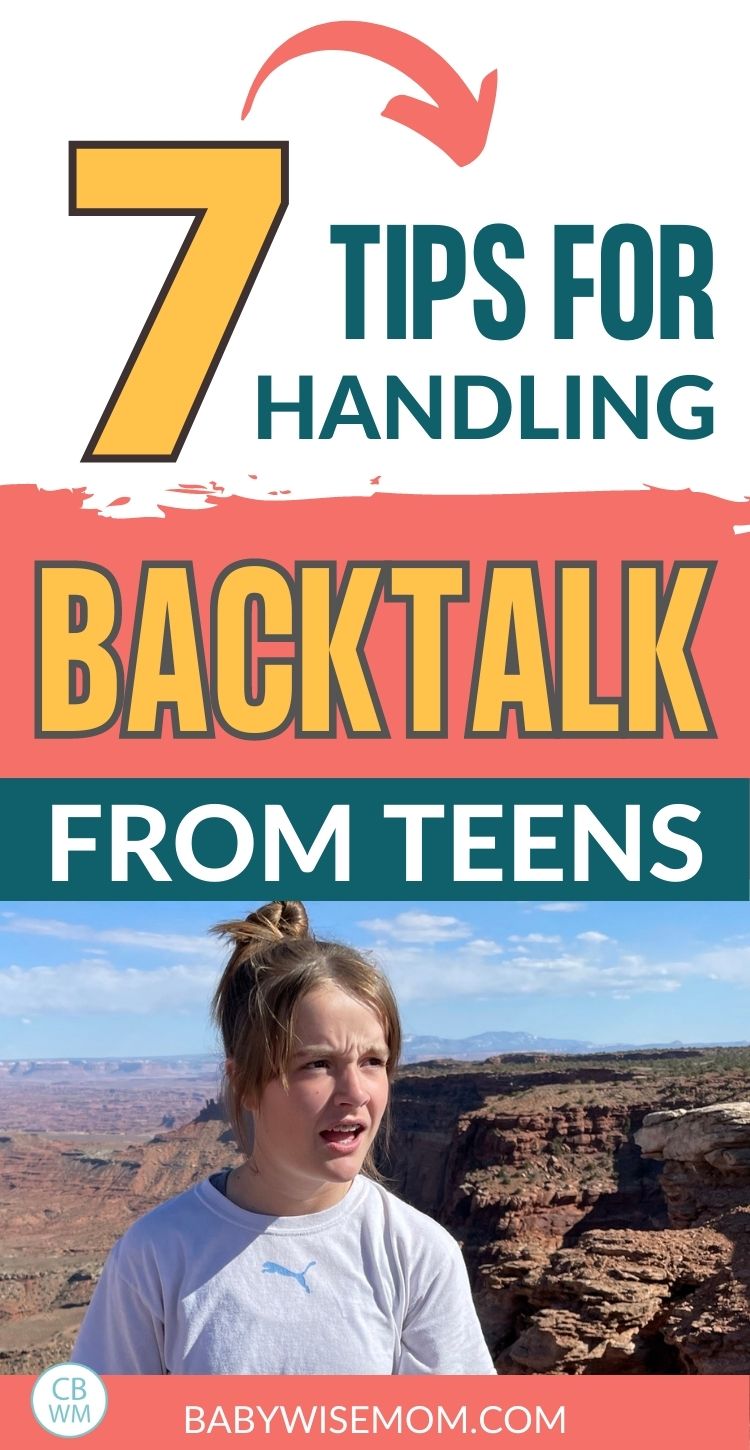Teen backtalk is frustrating. While it is normal for teens to backtalk, that does not mean that you do nothing to correct it. Get 7 tips for how to best handle backtalk. Learn how to respond as well as how to prevent it in the future.

Nothing quite fires you up like having your teenager backtalk you. The disrespect and hurt that you feel make it hard to think with a clear mind.
Follow these tips to best handle back talk from your teens. There are tips for responding in the moment as well as avoiding more issues in the future.
Post Contents
Teen Backtalk is Normal
Understand that it is normal for adolescents to backtalk.
Remember back when your child was a toddler? Remember those tantrums? Tantrums are normal for toddlers. Backtalk is normal for teenagers.
Just like we didn’t accept tantrums, we don’t accept backtalk. We want to problem-solve and get this figured out. But know that it is typical behavior and it doesn’t mean you have failed in some way.
Do not take the behavior personally. Address it and move forward.
Do Not Overreact
When your teen backtalks you, do not overreact.
Yelling at your child for speaking disrespectfully will not model the behavior you want from your teenager. Keep these things in mind when your child sasses you:
- Do not yell
- Stay calm
- Do not label or condemn your teen
- Remember you are raising future adults
Model Behavior
You want to show your teenager the behavior you want them to emulate. Demonstrate the correct way to respond when you do not disagree with something.
If your teen is talking back to you, then it is likely because your teen does not agree with something you have said or done. If you want them to respond reasonably, you also need to respond reasonably.
This will mean you keep your voice even. This will mean that you stay calm and do not take the behavior personally. You will keep your emotions in check. You will not lose your temper.
Remember that you are raising a future adult. At this point, your teen is not far away from being that adult. The time will pass before you know it. View your teen through that lens so you can prepare her to take on that role.
Do Not Label or Condemn
When your child makes a poor choice, you want to make sure you do not label or condemn your child for it. Your teen is not a “bad kid” or “rebellious person.” Your teen made a poor choice.
I can promise you that you have also made poor choices in your life. I can promise you that you have made decisions that you later regretted.
People live up to the expectations put upon them, and if you start to decide your teen is a list of negative qualities, they just might take those on to prove you right.
Have Standards and Rules
It is okay and even wise to have standards and rules.
While the backtalk is normal, it is okay to have a rule against it. You do not have to accept it. Just like we didn’t just let our toddlers through all the tantrums they wanted to, we want to work to prevent our teens from responding to frustrations with backtalk.
Your teen will need to be able to manage his emotions when he is upset. You can set up some boundaries for when your child disagrees. This might include:
- No swearing
- No eye-rolling
- No backtalk
- No slamming doors
- No personal attacks
- No physical aggression
- No rude behavior
You can expect your teen to have respect, have a good attitude, and keep words kind.
You want to also have rules for other life situations. For example, you want clear rules about cell phone use. Then when rules are broken, the consequences are understood. It is clear and can be without emotion.
Have Consequences
If you have rules, you need to have consequences for breaking rules. Decide what the consequences will be for backtalk ahead of time.
It does not often work out well to dole out punishment in the moment of conflict.
If you have established clear and firm boundaries and already discussed the consequences for disrespectful behavior, then you can definitely respond to negative behaviors right away and enforce the established rules.
If not, it can be good to take a moment to think. I find teens do really well if you take a break and ask them to think of what the consequence should be for their behavior. They will typically think of a harsher consequence than you would.
It is helpful to talk about and establish consequences before there is conflict happening.
What privileges will be lost? What are your house rules? Will the cell phone be lost? What freedoms will be lost? Establish it all so you both know what to expect.
Talk It Out In the Moment
I would recommend you work to keep things light. If your child responds to you with backtalk, it does not need to turn into a big thing. You can start out by saying, “Um, try again.”
This works well if you have rules and consequences in place. Get that mom look on your face and have them give that comment another try. Give them a chance to make it right immediately. This does not need to be a power struggle.
If they double down, you will need to go a step further.
If your child backtalks you, then it is because your teen has some displeasure from something you have said or done.
It is really helpful to talk things out.
You want to talk about it in a calm way, so make sure you take a break if needed. You might say, “We are going to talk about the way you have just spoken to me. Let’s take 15 minutes to calm down and think about it the talk about it.”
This gives both of you time to think about what has happened and also allows you both time to calm down.
When you talk, you want to get on the same page as each other. You want to share your perspective as to why you have the rule or policy they are so upset about.
You want to listen to their perspective and find out why they are so upset. Make sure you really listen and seek to understand. You want to really listen.
Have a conversation, not a lecture. A conversation will mean that you BOTH talk and express yourselves.
Make sure you stay on topic. If your child is upset about a curfew you have given, talk about curfew. Do not derail into your child leaving their shoes out all the time. Stay on the topic at hand.
End the conversation once it is over. Do not drag it out or belabor the point.
If things get too heated while you are talking it out, it is okay to take a break. Take a deep breath, separate for a time, and come back together once you are both ready.
Establish a Respectful Way to Disagree
Your teenager will have different opinions than you have. There will be rules your teen does not agree with.
Teens will talk to peers and compare notes about what they all do and do not get to do.
As humans, we disagree with others often. We need to teach our kids problem-solving skills, and part of that is learning how to disagree with others in a polite manner.
Your teenager is getting really close to moving out of the house on their own. They need to be able to have their own opinion.
Teenagers who are never allowed to disagree with their parents grow up to be adults who are incapable of making their own decisions.
Do not stifle your child from having his own thoughts.
Give him a way to disagree with your respectfully.
This is something you will want to talk about in a time of non-conflict.
Teach them that they will want to remain calm. They might need to take a deep breath.
You will both need to listen to each other and use reflective language. Repeat what you view their perspective to be. That shows you are listening and it opens the door to clear up misunderstandings.
Analyze Your Teenager’s Freedoms
As our kids get older, we need to increase their freedoms. A teen should have more freedom than a tween. During the teen years, your child transitions from a child to an adult.
If you give too little freedom, your teen will rebel as she tries to fight for her rights.
If you give too much freedom, your child will become wise in her own eyes and think she knows best.
Additional freedoms need to be given as your child gets older. Along with this, additional responsibilities need to be given.
>>>Read: How Much Control Should You Give Teens
Build Relationships
The best way to handle backtalk is through prevention.
If your child is young, establish boundaries now. Establish rules and consequences now.
Analyze those freedoms consistently as your kiddo grows.
Build a solid relationship with your child. Have a relationship where you have your child’s respect. Spend time with your child. Build that bond with your child.
Show love to your child. Through that love, your child will trust you. Your child will trust that your rules and standards come from a place of love. Your child will also know that it is okay for them to talk to you about concerns they have–even if that concern is you and your rules.
Conclusion
The teen years are a time full of a lot of growth as your child prepares to move out and be an independent adult. Follow these ideas when backtalk comes up so you can work to maintain a strong relationship and show your teen how to handle conflict in a healthy way.
Related Posts
- Cell Phone Rules for Teens and Tweens
- Technology Rules for Teens
- Teen Driving Contract (with free printable)
- How to Respond to “Everyone Else is Doing It”
- Have a New Teenager By Friday Book Review
- How To Successfully Combat Teen Attitude
- Should You Give Your Teenager a Curfew?

